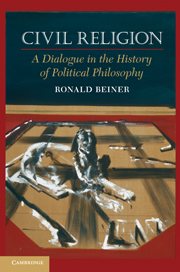Book contents
- Frontmatter
- Contents
- Preface and Acknowledgments
- Introduction
- Part I Machiavelli, Hobbes, Rousseau
- Part II Responses to (and Partial Incorporations of) Civil Religion within the Liberal Tradition
- Part III Theocratic Responses to Liberalism
- 25 Joseph de Maistre
- 26 Maistrean Politics
- 27 Maistre and Rousseau
- 28 Carl Schmitt's “Theocratic” Critique of Hobbes
- Part IV Postmodern “Theism”
- Conclusion
- Index
- References
26 - Maistrean Politics
Published online by Cambridge University Press: 05 June 2012
- Frontmatter
- Contents
- Preface and Acknowledgments
- Introduction
- Part I Machiavelli, Hobbes, Rousseau
- Part II Responses to (and Partial Incorporations of) Civil Religion within the Liberal Tradition
- Part III Theocratic Responses to Liberalism
- 25 Joseph de Maistre
- 26 Maistrean Politics
- 27 Maistre and Rousseau
- 28 Carl Schmitt's “Theocratic” Critique of Hobbes
- Part IV Postmodern “Theism”
- Conclusion
- Index
- References
Summary
Political authority is not mysterious, nor is it to be sanctified by symbols and rituals citizens cannot understand in terms of their common purposes.
– John Rawls[Good politics requires] the absolute and general rule of national dogmas.…[I]f each man makes himself the judge of the principles of government you will see immediately the rise of civil anarchy or the annihilation of political sovereignty. Government is a true religion; it has its dogmas, its mysteries, its priests; to submit it to individual discussion is to destroy it.
– Joseph de MaistreAll the most interesting thinkers are uncompromising radicals, prepared to follow their respective thought-paths as far as it takes them. There is no question that this applies to Maistre. Consider Isaiah Berlin's description of Maistre's radicalism: “[Maistre] resembled Rousseau. Just as Rousseau imposed a kind of Calvinist logical strait-jacket upon what was really a kind of burning private lunacy, so Maistre imposes an official legitimist Catholic framework upon what is really a deeply violent, deeply revolutionary inner passion.” There may be reason to consider this a very unjust slander of Rousseau, and it may or may not do justice to Maistre, but Berlin's statement does nicely capture the utter radicalism of Maistre's thought.
To carry a bit further our brief tour of Maistre's intellectual world, let us take a look at the Considerations on France. Maistre begins the book with a defense of the providential character of the French Revolution. This is absolutely extraordinary for someone who hated the French Revolution with every fiber of his soul! Maistre writes, “never has the Divinity shown itself so clearly in any human event. If the vilest instruments are employed, punishment is for the sake of regeneration”; and “we should not be surprised if [France] is brought back to her mission by terrible means. It has been a long time since we have seen such frightful punishment inflicted on such a large number of guilty people.” This is far from what one would expect – not that the Revolution was inflicted by a small band of madmen and criminals upon the innocent, but rather that the Revolution was a justified punishment for a nation that was guilty. Maistre loves the Reign of Terror – because it punishes the guilty (i.e., everyone is guilty). Again, this is utterly extraordinary coming from someone who hated the Revolution with his whole being. Politics, for Maistre, is a realm of submission to divine authority and, in the case of revolt, of the inflicting of divine punishment. Punishment is central to politics, and all punishment is divinely ordained.
- Type
- Chapter
- Information
- Civil ReligionA Dialogue in the History of Political Philosophy, pp. 343 - 352Publisher: Cambridge University PressPrint publication year: 2010

